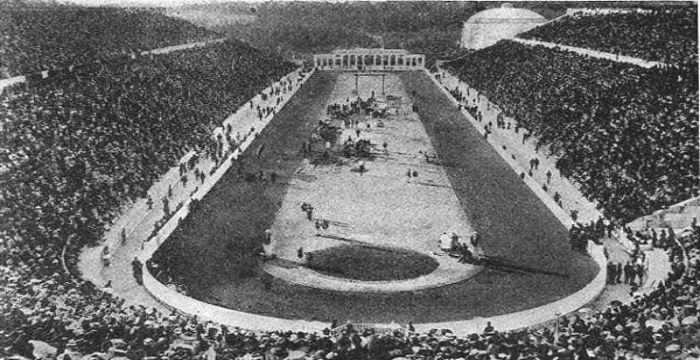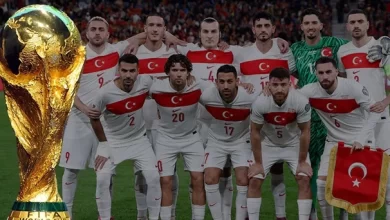ANCIENT ORIGINS OF THE OLYMPIC GAMES

The Olympic Games are the largest and most complex sporting event in the world: In the number of sports on the programme, the number of athletes present and the number of people from different nations gathered together at the same time in the same place. Participants from the entire world take part in the games. Their achievements are watched from both near and far by hundreds of millions of spectators. The Games are as much a celebration of innovation and creativity as they are of humanity, fair play and sporting excellence.
Birth of the Games
The Olympic Games as we know them today are a tradition which have a long history goes back to ancient Greece.
The ancient Greeks loved competition of all sorts. Each year, the various city-states of Greece sent athletes to festivals, which were held to honor the gods. By the end of the 6th century B.C. at least four Greek sporting festivals had achieved major importance: the Olympic Games held at Olympia; the Pythian Games at Delphi; the Nemean Games at Nemea; and the Isthmian Games held near Corinth.
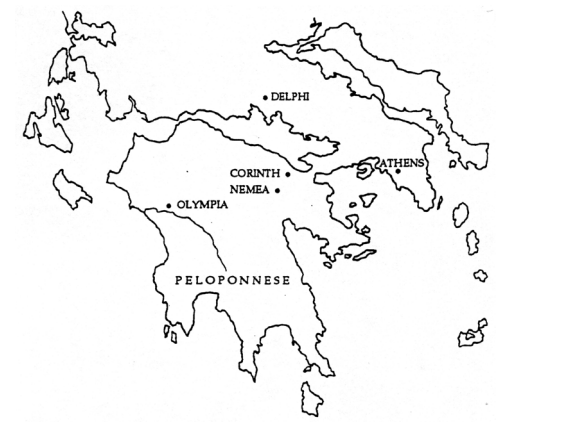
The most important and prestigious games were the games held at Olympia, and they were named after their location, ‘Olympic Games’. These Olympic games took place in the summer once every four years. The Olympic Games, like almost all Greek games, were part of a religious festival. They were held in honour of Zeus at Olympia by the city-state of Elis in the northwestern Peloponnese. The Games occupied such an important place in Greek history that in late antiquity historians measured time by the interval between them—an Olympiad!
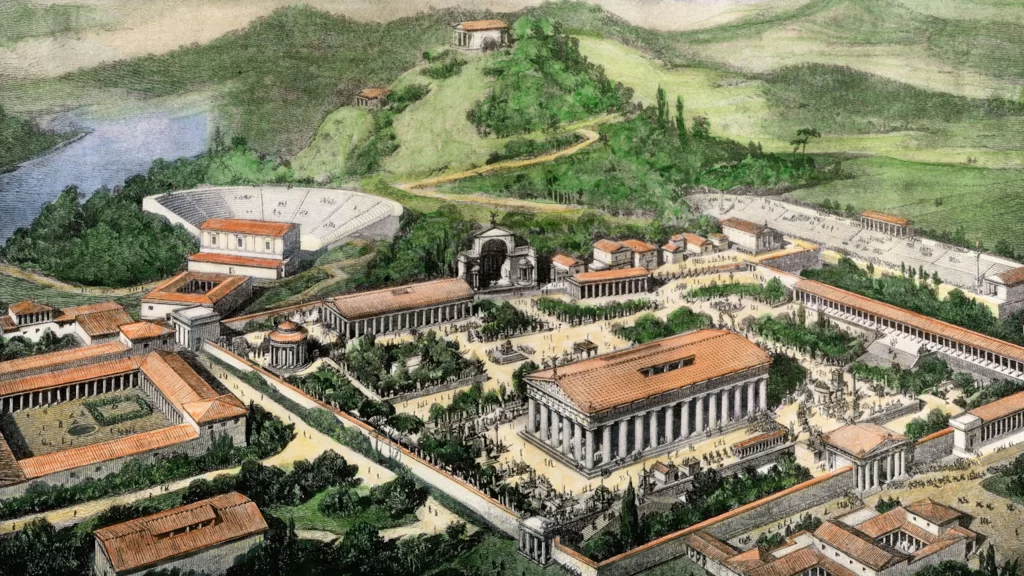
The Beginnings
Greeks had been explaining the starting point of the Olympics with myths. One of the most popular myths identifies Heracles and his father Zeus the progenitors of the Games. According to legend, after Heracles completed his twelve labours, he built the Olympic Stadium as an honour to Zeus. It was Heracles who first called the Games “Olympic” and established the custom of holding them every four years. That part is legend and mythology, so no one really knows when it’s supposed to have taken place. But the down-to-earth Olympic Games began as a tribute to the Greek gods, particularly to Zeus and Heracles, some 3000 years ago.
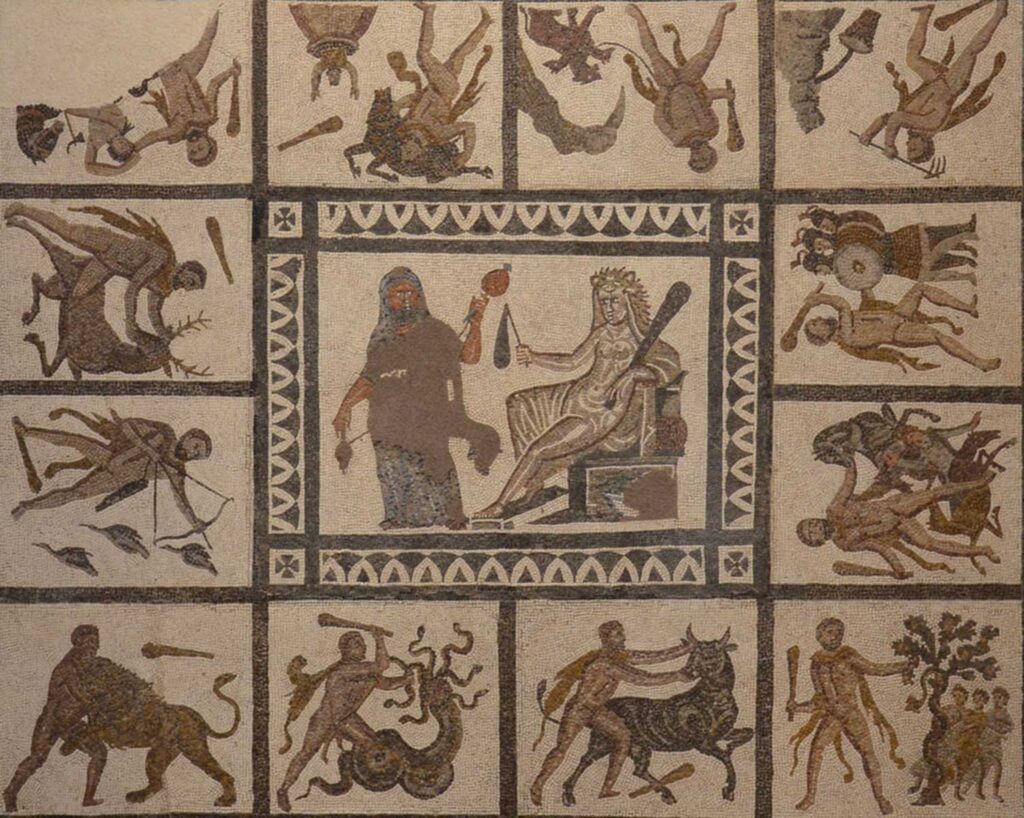
The earliest recorded Olympic Games took place in 776 B.C. It is very likely, however, that Olympic games took place for hundreds of years before then. The Olympic Games, attracted people from across Greece and Greek city-states throughout Mediterranean. Before the games began, messengers were sent out to all the major Greek cities around the Mediterranean to announce a ‘sacred truce’ or a peace. This meant that any wars and hostilities should be called off during the period of Games so that people could travel safely to and from Olympia. The games at Olympia continued with minor interruptions into early Christian times and were the inspiration for the modern Olympic Games, first staged in Athens in 1896.
What Were the Ancient Games Like?
Footrace
The ancient games featured many competitions that still take place in the modern Olympics, such as foot race, jumping, discus throwing, javelin throwing, wrestling, the pentathlon (a combination of the previous five events) and boxing. At the first meeting in 776 B.C. there was apparently only one event, a footrace that covered one length of the track at Olympia, other events were added over the ensuing decades. The race, known as the stade, was about 192 metres long. The word stade also came to refer to the track on which the race was held and is the origin of the modern English word stadium. In 724 B.C. a two-length race, the diaulos, roughly similar to the 400-metre race, was included, and four years later the dolichos, a long-distance race possibly comparable to the modern 1,500- or 5,000-metre events, was added.
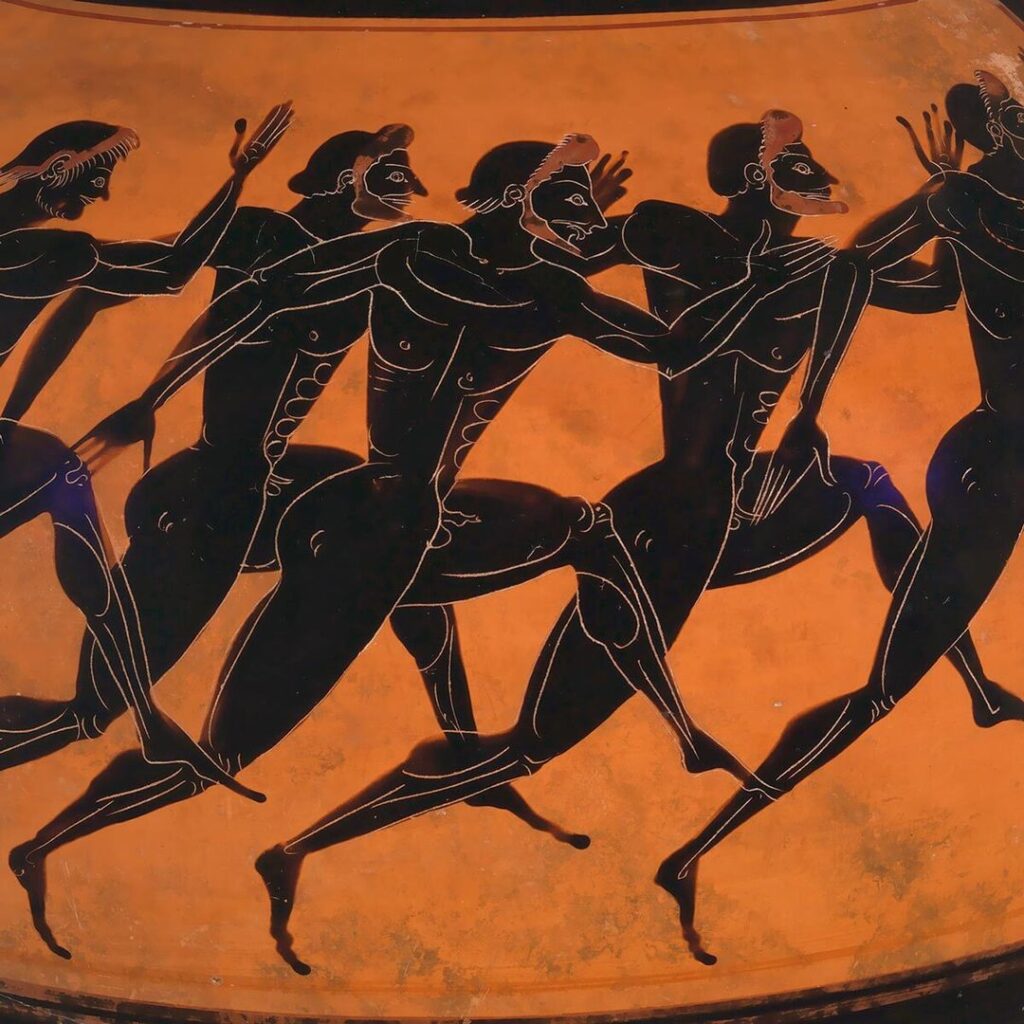
Jumping
In the ancient long jump athletes carried weights that were swung forward on take-off and back just before landing. It’s often said that the weights increased the length of the jump. Most ancient sport developed as a means of training for warfare, and this exercise would simulate a jump carrying kit. Skill in this sport would be useful for crossing a stream or ravine.
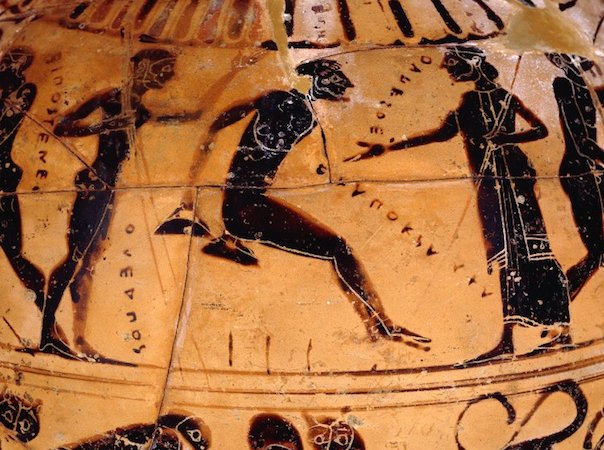
Discus Throwing
The ancient Greeks considered the rhythm and precision of an athlete throwing the discus as important as his strength. In the discus throw, athletes competed with discuses were made of stone, iron, bronze, or lead, and was shaped like a flying saucer. Also, the sizes varied.
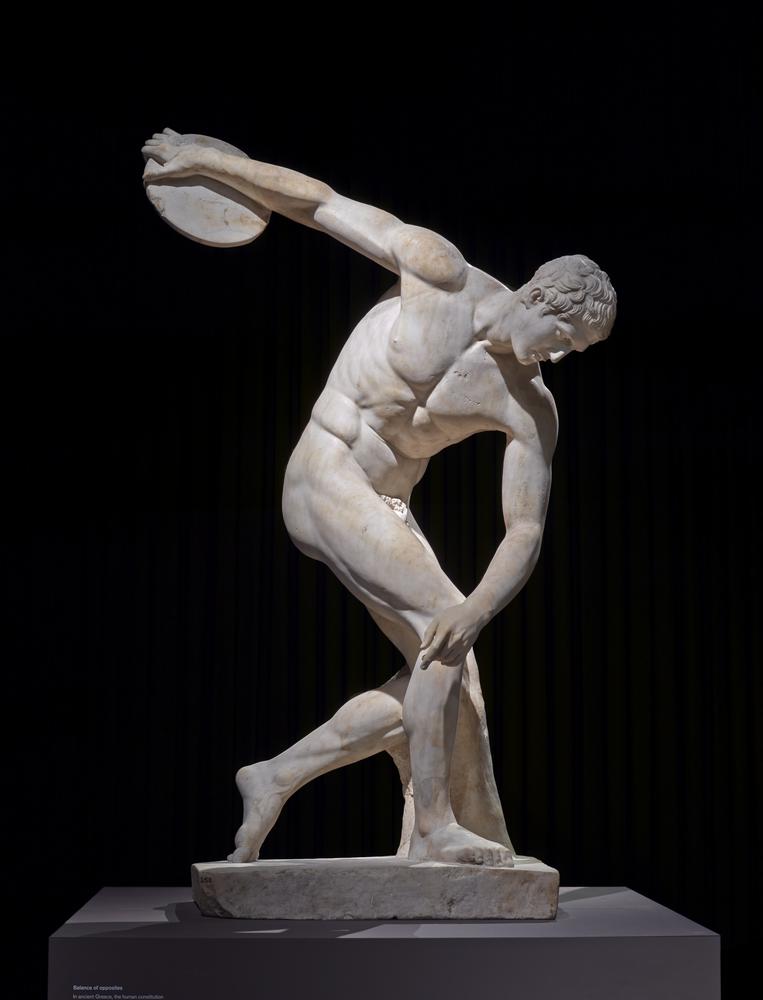
Javelin Throwing
Throwing the javelin was one of the five events of the pentathlon. It was not put on as a separate event. The competition took place on the running track. The athletes began a few meters before the start with a short preliminary run and threw the javelin as far as possible from the starting line. The javelin was made of wood and about as long as a man.
The main difference with the contemporary method of throwing is the leather loop the Greeks attached to the spot where they held the javelin. By placing one or two fingers in the loop, the athlete could extend his arm artificially, with the advantage that the javelin could be accelerated over a longer distance.
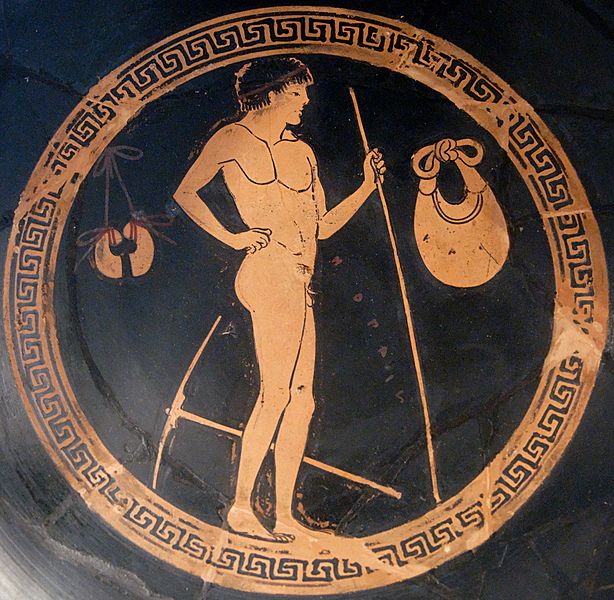
Wrestling
Wrestling is the oldest form of fighting without weapons. There were two forms: upright wrestling and ground wrestling. To win in upright wrestling one had to make his opponent fall three times. Whereas today the back of the opponent should touch the ground, for the Greeks any part of the body counted. With ground wrestling the whole body could touch the ground and one only won if the opponent submitted by pointing up his index finger to the umpire. Upright wrestling was practised in the sandpit that was also used for the long jump; ground wrestling was done on wet sand. Upright wrestling became an Olympic event in 708 B.C. together with the pentathlon. Ground wrestling never took place at the games. Wrestling matches were organized both as a separate event and as part of the pentathlon.
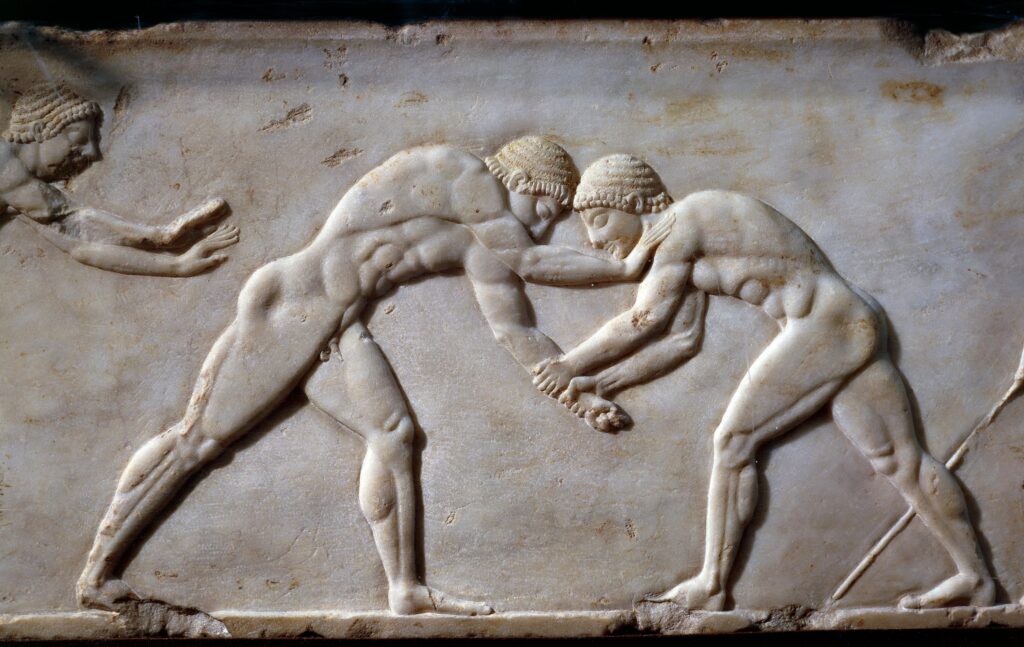
Pentathlon
The pentathlon was introduced at Olympia in 708 B.C. together with wrestling. It combined the following events; discus throwing, the long jump, javelin throwing, footrace (probably the stade) and wrestling. The Greeks admired the bodies of pentathletes, because they possessed the ideal combination of length, strength, speed and beauty.
Characteristics of the Games
The Participants and Winners
The Olympic Games were restricted to freeborn Greek males. Many Greek competitors came from the Greek colonies on the Italian Peninsula and in Asia Minor. Most of the participants were professionals who trained full-time for the events mostly in their home city-state’s ‘gymnasium’. Valuable prizes could be won in athletic contests all over the Greek world, but victory at Olympia brought the greatest prestige. Although the only prize at Olympia was a wreath or garland, the athlete mostly received a wreath of leaves such as olive, laurel or wild celery leaves, depending on the festival. An Olympic champion also received widespread adulation and often lavish benefits from his home city.
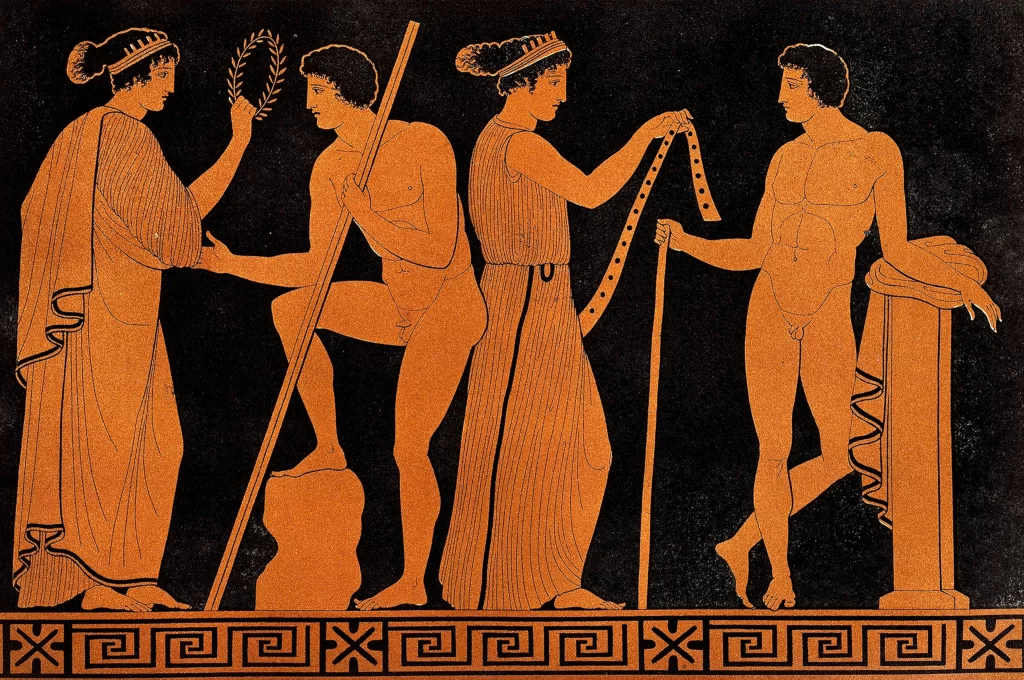
Nudity
Another striking characteristic of Greek athletics is that athletes exercised and competed nude. Athletes competed naked as a tribute to the Greek God Zeus. They wanted to show Zeus their physical power and muscular physique. Since Greek heroes were often depicted nude in artwork and sculptures, this inspired athletes to train harder and win their event. Athletes wanted to be compared to true heroes like Heracles and Achilles.
In the ancient Near East nudity was a sign of sin and disgrace. For the Romans public nudity was offensive as well. A gentleman could not show himself naked in public. The Greeks on the other hand were proud of their naked bodies. They considered public nudity as a way to show their superiority over other people. This superiority lays in the ideal of self-control. By self-control they could look calm and balanced.
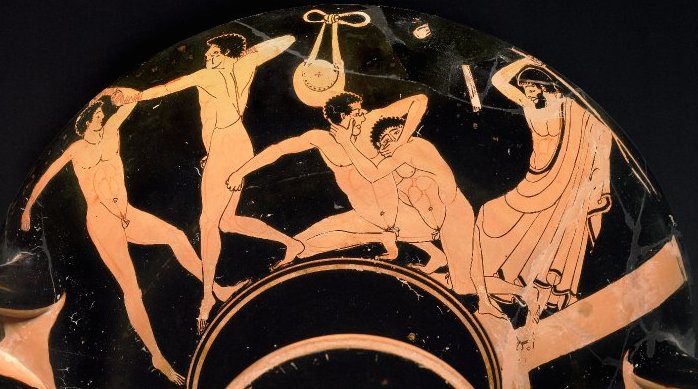
The Women
Only men, boys and unmarried girls were allowed to attend the Olympic Games. Married women were said to have been banned from participating to the games. At Olympia however, the Herean festival, held every four years in honour of the goddess Hera, included a race for young, unmarried women, who were divided into three age groups. The purpose of those games was “to make the girls stronger so they would bear strong children.” Yet the Herean race was not part of the Olympics (they took place at another time of the year). Then for a brief period girls competed at a few other important athletic venues.
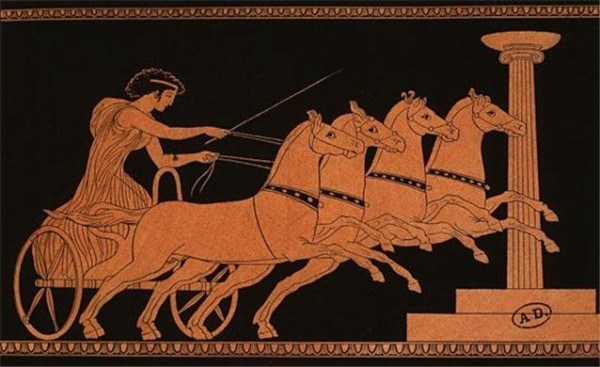
How Did the Ancient Olympic Games Come to an End?
Greece lost its independence to Rome in the middle of the 2nd century B.C, and support for the competitions at Olympia and elsewhere fell off considerably during the next century. In the first quarter of the 4th century A.D, The Olympic Games were finally abolished by the Roman emperor Theodosius I, who was a Christian, as part of his efforts to suppress paganism in the Roman Empire. Since the Games were considered pagan associated and influenced. They essentially were being held in honour of Pagan gods and goddesses. Yet inscriptions and literary sources confirm that athletic games continued into the early fifth century at prestigious venues, including Olympia and Athens.
Nearly a millennium and a half later, the Olympics returned, reviving the ancient spirit of competition and community on a global scale.
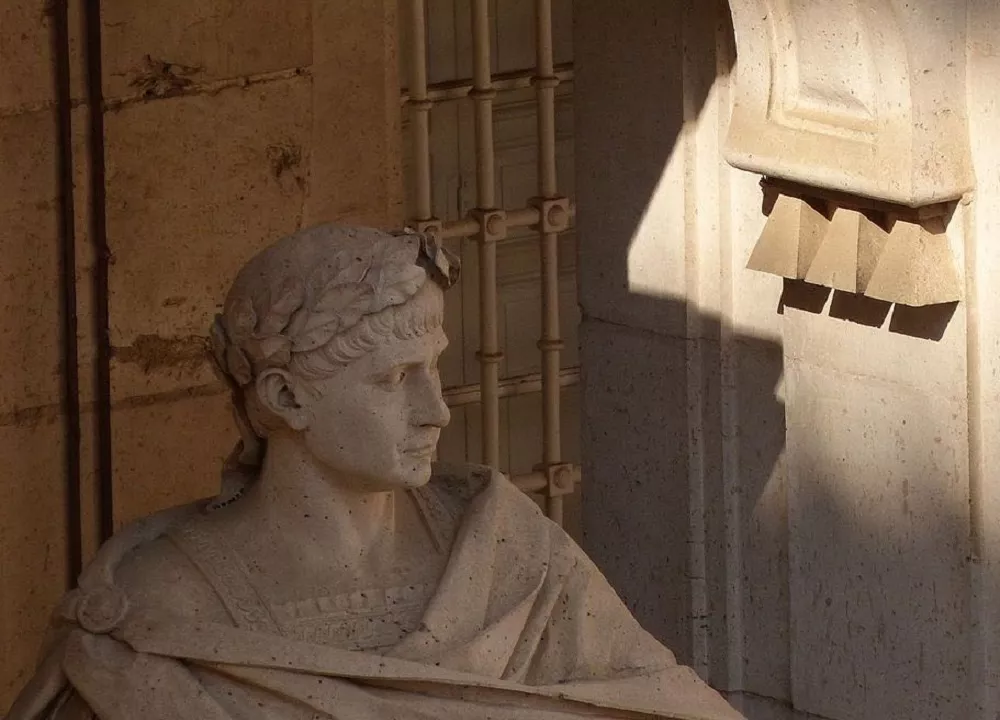
Renaissance of the Olympic Games
With the Renaissance, Europe began a long fascination with ancient Greek culture, including sports. In the 18th and 19th centuries some nations staged informal sporting and folkloric festivals bearing the name “Olympic Games.” However, it was not until 1892 that a young French baron, Pierre de Coubertin, seriously proposed reviving the Olympics as a major international competition that would occur every four years. At a conference on international sport in Paris in 1894, Coubertin again raised the idea, and his proposal was approved. The International Olympic Committee (IOC) was formed, and the first Games were planned for 1896 in the birthplace of the Olympics, Greece!
At the time Olympic Games lacked much popular support and were overshadowed by world’s fairs. But over time with major difficulties, the Olympic Games have come to be regarded as the foremost international sports competition.
